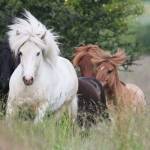Checking Equine Wellness from Across the Fence

What can you tell about your horse’s state of health when he’s all the way across the pasture? Actually, you can probably learn quite a lot if you’re aware of subtle indications that the horse may be sick or uncomfortable. Practically any behavior that is out of the ordinary for your horse might be a danger sign.
Horses are herd animals, and the instinct to stay with their pasture-mates is strong. If your horse is standing or lying down by himself at some distance from the herd, this could be a sign that he’s not well. If the rest of the horses are enjoying a gallop around the field and your horse is standing by the fence with a lowered head, the same thing can be concluded.
If the other horses in the field appear comfortable and your horse is covered in patchy sweat, this might be a sign of colic, muscle pain, or some other problem.
Lameness is usually fairly obvious, but your horse might show other postural signs that indicate discomfort. If he’s standing with all four feet pulled more closely together under his body than usual; with one front hoof pointed out ahead of the other; with one forefoot resting on its toe (hind feet resting this way are okay); or with both front feet out in front of the body and leaning his body back onto the hind legs, these are all red flags that tell you there’s some significant pain in his back, legs, or hooves.
Horses in good health stay aware of the sights, sounds, and smells in around them. If all the other horses in the field are staring at a stray dog or spooking at the sound of a backfiring truck and your horse seems to be ignoring these distractions, he may not be feeling good.
Any time a horse doesn’t do what the others are doing, or doesn’t react in his customary way to events around him, you should suspect a problem. Note: One situation that shouldn’t be a cause for concern is when all the other horses in the herd are lying down for an afternoon nap and your horse is the only one standing up. It’s common for one horse to be on “guard duty” while the others are resting, most likely a leftover behavior from times when horses were subject to attack from predators. Herd instinct continues to require a lookout, and this duty usually rotates through the horses in a group.








